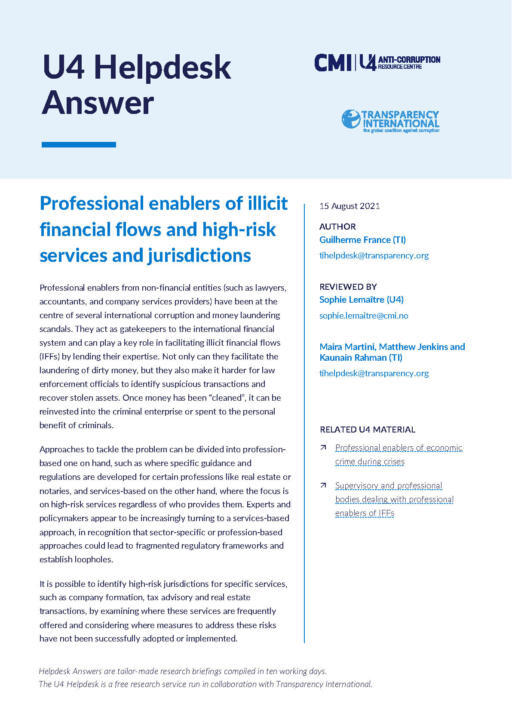- Home
- Anti-Corruption Helpdesk
- Professional enablers of illicit financial flows and high-risk services and jurisdictions
Professional enablers of illicit financial flows and high-risk services and jurisdictions

This Anti-Corruption Helpdesk brief was produced in response to a query from a U4 Partner Agency. The U4 Helpdesk is operated by Transparency International in collaboration with the U4 Anti-Corruption Resource Centre based at the Chr. Michelsen Institute.
Query
Which activities undertaken by professional enablers are considered to be the highest risk for money laundering, corruption and tax fraud (illicit financial flows – IFFs), and which jurisdictions offer higher risks for these activities?
Summary
Professional enablers from non-financial entities (such as lawyers, accountants, and company services providers) have been at the centre of several international corruption and money laundering scandals. They act as gatekeepers to the international financial system and can play a key role in facilitating illicit financial flows (IFFs) by lending their expertise. Not only can they facilitate the laundering of dirty money, but they also make it harder for law enforcement officials to identify suspicious transactions and recover stolen assets. Once money has been “cleaned”, it can be reinvested into the criminal enterprise or spent to the personal benefit of criminals.
Approaches to tackle the problem can be divided into profession-based one on hand, such as where specific guidance and regulations are developed for certain professions like real estate or notaries, and services-based on the other hand, where the focus is on high-risk services regardless of who provides them. Experts and policymakers appear to be increasingly turning to a services-based approach, in recognition that sector-specific or profession-based approaches could lead to fragmented regulatory frameworks and establish loopholes.
It is possible to identify high-risk jurisdictions for specific services, such as company formation, tax advisory and real estate transactions, by examining where these services are frequently offered and considering where measures to address these risks have not been successfully adopted or implemented.
Contents
1. Introduction
- Damage done by enablers
2. High-risk services in high-risk jurisdictions
- Identifying high-risk jurisdictions
- Services and activities provided by professional enablers
i. Setting up companies, trusts and other business structures
ii. Tax advisory and investment services
iii. Real estate transactions
iv. High-value goods, precious metals, and stones
3. Regulation for enablers
- Anti-money laundering framework
- Dual approaches: profession-focused or services-based
4. References
Main points
- Professional enablers from non-financial sectors play a key role in facilitating illicit financial flows, e.g. laundering proceeds from corruption, tax evasion and organised crime.
- A number of activities and services provided by professional enablers are considered high-risk, including company formation, tax advisory, real estate transactions, and trade of high-value goods, precious metals, and stones.
- A services or activities-based approach allows for better intelligence collection and more effective supervision.
- It is possible to identify high-risk jurisdictions for specific services by analysing where these services are frequently offered and where measures to mitigate these risks are insufficient.
Caveat
This answer does not focus on financial institutions and banks. Although they also provide services that are at high-risk of IFFs, including money laundering, financial institutions are regulated and supervised but the challenges they faced in implementing standards are different. The answer uses the expression “professional enablers” to refer to the set of non-financial businesses and professions that play a key role in facilitating illicit financial flows.
Authors
Guilherme France (TI), [email protected]
Reviewers
Sophie Lemaître (U4), [email protected]
Maira Martini, Matthew Jenkins and Kaunain Rahman (TI), [email protected]
Date
29/10/2021

